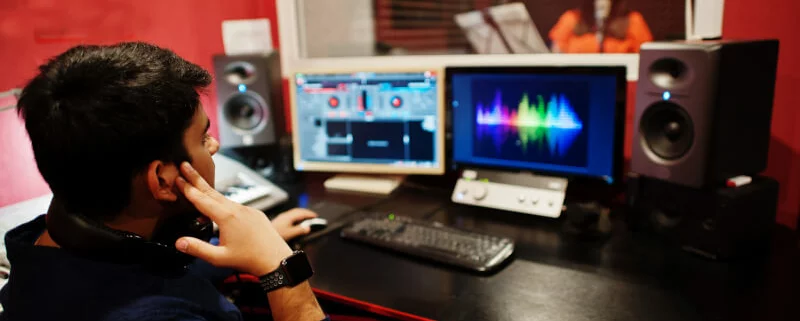Crucial Advice for Aspiring Music Producers
If you’re an ambitious record producer who’s been thinking about breaking into the industry, now is the moment! The world of music creation is broad; there are more musical styles and instruments available now than at any previous moment in history. Even while starting started with production may appear to be a daunting undertaking at first, if you begin to focus your efforts on a daily basis, you will be able to do great things over time. The following are ten important bits of advise for new producers:
Be Motivated and Get Inspired
Inspiration is what drives you to produce new music, and it almost goes without saying that this is the case. It is critical that you keep your hearing healthy by listening to noises from the past, as well as those from the present and the future. Do you want to make music for the generation that follows you? Make it a point to become acquainted with music from previous eras, as this can help you better understand the origins of musical forms that you enjoy.
By listening to music, you can keep an open mind and expose yourself to a wide range of musical styles. Because there is good music in every genre, it is critical to acquire an appreciation for a diverse variety of musical styles and musicians from whom you can draw inspiration.
Make the Most of the Resources You Have
Although it’s tempting to spend your money on every synth, plug-in, and sample pack available, it’s better to learn to write with a few simple tools rather than a plethora of intricate ones. Despite what the marketing may lead you to believe, you do not need every new piece of technology that hits the market. Working with just one synth, a few plug-ins, and one digital audio workstation (DAW) and understanding how to fully utilise these tools is far more effective.
It will take some time to learn new pieces of equipment and become truly proficient with them. There are several legendary producers who create the majority of their sounds using only one or two plug-ins or synths, and they create their drums with only one drum machine. Choose your studio gear wisely, and make it a point to train yourself how to use everything you have.
Maintain Your Organied
It is easy to get carried away in the intensity of the moment during a session and end up generating numerous tracks and buses. It’s natural for creative mayhem to arise, but if you spend a few minutes labelling and organising your session, getting back to work on the track will be much easier. To categorise the recordings, labelling and colouring audio files can be done either during or after the session. When you plan to collaborate with other artists on a project or pass over your session to another person to be mixed, having a properly labelled session becomes even more important. It is especially useful while recording because it allows you to identify different takes as you go and keep track of which songs were the best.
If you’re editing a previously recorded session, try color-coding the audio segments based on the quality of the takes. For instance, blue would indicate the best takes, green would represent the second best takes, and so on. You can also color-code tracks based on the basic frequencies they contain; for example, kick drums can be red, snares can be blue, and so on. Create a method that meets your needs and make an effort to put it into action.
Take a look and listen
Consume a lot of high-quality content about producing, both in reading and viewing form. Because of the amount of resources for producers available both online and offline, access to information on music production is now much easier than it has ever been. You can educate yourself by reading or watching videos, depending on how you absorb information best. AskVideo offers a wide choice of high-quality instructional videos on digital audio workstations (DAWs) such as ProTools, Logic, and Ableton Live. Another excellent technique to educate yourself on new plug-ins and polish your skills in the production of specific musical styles is to watch lesson videos created by expert producers.
You may learn how to use cutting-edge hardware like Maschine by watching online Masterclasses offered by AskVideo at your leisure and on your own time. It is a low-cost option to gain access to high-quality music production tuition, with over 798 courses and 42,720 individual sessions. YouTube is another another fantastic source of information; but, because anyone can upload a tutorial to YouTube, you will need to do a lot of “sifting” in order to discover high-quality content. There’s a good chance you’ll find a video on YouTube showing you how to make any sound. There will be one good video, one decent video, and one not so good video among those connected to the theme. Because you must choose amongst the many alternatives, AskVideo is the platform of choice for tens of thousands of music producers.
Consider your favourite artist’s work in depth
The only way to fully progress as a producer of a specific style is to learn from others who have mastered that sound. Do you have a favourite or two in the field of production? Examine their work thoroughly, paying special attention to the many types of sounds they used and the structure of their tracks. Attempting to replicate tracks is an excellent way to get started making music because it will teach you a lot about sound design and give you a better understanding of song structure and arrangement.
You might even want to duplicate their tracks in the session and ‘A/B’ them, which means toggling between the song you’re working on and the original track. This is known as “A/Bing.” Even if you don’t want to imitate someone else’s sound forever, learning how to create contemporary sounding recordings by replicating the work of another producer is a terrific experience. Attempting to replicate the sound of another producer’s work.
Learn More About Sound Design
There are many amazing plug-ins on the market today that come with fantastic-sounding presets. Although presets can provide a stable foundation for song composition, producers should have a fundamental understanding of the principles behind sound design and synthesis.
Do you have no idea where to begin? You should opt for a simple synthesiser, either hardware or software-based, with one or two oscillators. Discover how different types of waveforms sound, how sounds are produced, and how to create a few bespoke patches for use in your work.
Collaboration with the Producers (who are better than you)
One of the most effective ways to develop one’s knowledge in the production process is to collaborate with other music producers. Expect every producer to work in a different way than you do, since this will introduce you to fresh ideas and methods of accomplishing things. Working with producers that are more experienced than you is in your best interests because they will be in a better position to provide creative ways that can help you improve your abilities.
Make an effort, if at all feasible, to network with producers from previous generations; they pioneered the musical styles that you wish to mimic in your own work. If you are fortunate enough to be able to speak with them, you should question about the process they utilised to make their song. You could be able to sit in on one of their sessions, record a track with them, or even gain a big break from them if you’re incredibly lucky! When you create opportunities for yourself, you place yourself in a position where everything is possible.
Practice
It should go without saying, but the key to mastery in any discipline is repetition. Create a routine in which you make beats on a regular basis, and make an attempt to create a studio timetable for yourself. You will need to clear some space in your life in order to have the time necessary to work on tasks. For example, you may set aside some time in the morning to focus on your music creation, or you could work on your tracks every evening after supper.
If you approach music production methodically and have defined goals for the type of sound you want to create, the process will become less difficult over time. Remember to save a copy of your work at regular intervals on an external hard drive or in the cloud, and polish your tracks to the best of your ability.
The process of creating music is a life-long endeavour… If you put in the effort, it’s the type of activity that will reward you!



